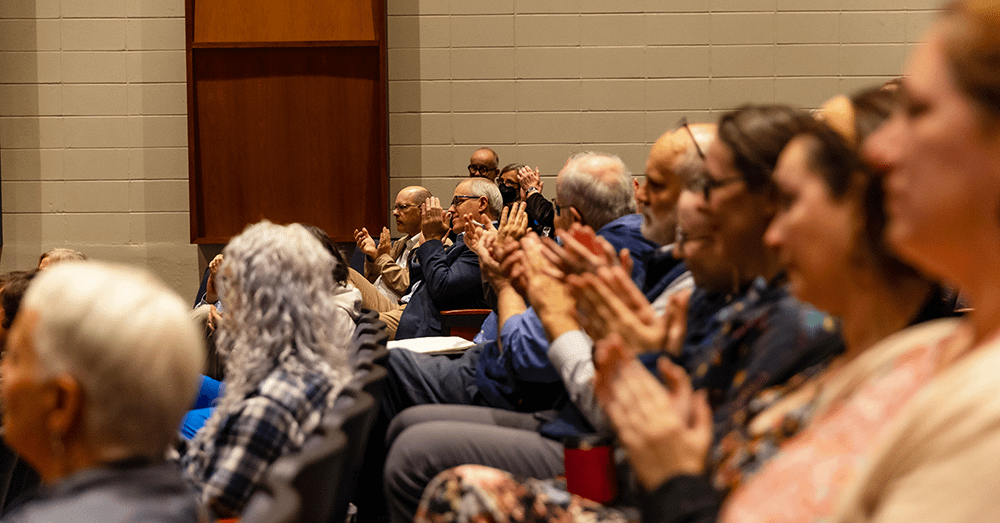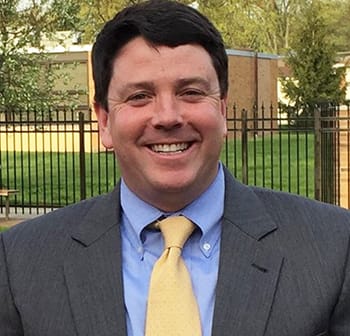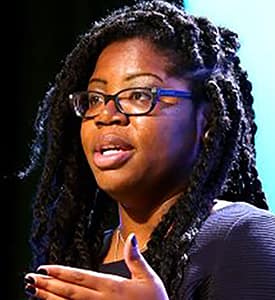Speakers on Faith Journeys
Speakers’ faith journeys each filled with action and intrigue
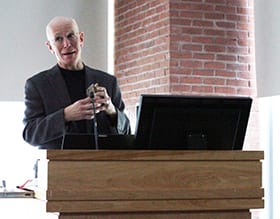
Directly above, Fr. Columba Stewart prepares to pass around an example of an ancient text during a later talk the same day in the same space. Below are various other images from the two events, including a closer view of the text being passed around, a pile of author Auth’s new books that he signed, him signing one for an audience member, and shots reflecting the large crowd attending each George Dameron is with Fr. Stewart at bottom. .( Photos by Lauren Read, Fr. Columba crowd shot by Mark Tarnacki)
Either of two action-packed and luminous Catholic-faith stories shared before large audiences at separate speaker events Monday in Saint Michael’s College’s Dion Family Student Center Roy Event Room felt worthy of Hollywood.
A noon “Food For Thought” luncheon featured Wall Street evangelist and author Steve Auth. Though at the top of his profession as an investor and high-level finance executive, Auth focused mostly on his and his wife’s robust Catholic street corner ministry in New York City that encounters the intriguingly raw and unfiltered, ever-searching, myriad faces of humanity on a daily basis.
Auth also visited Professor Ray Patterson’s Christian social ethics class in the morning before this September 30 lunch talk, and business Professor Xinting Zhen’s investment class in the afternoon. Also, courtesy of generous College benefactor Don Dion, who was in the audience for the luncheon as a friend and supporter of Auth, copies of the speaker’s recent book The Missionary of Wall Street were offered to all who attended – more than 100 students, faculty and staff along with members of the outside community.
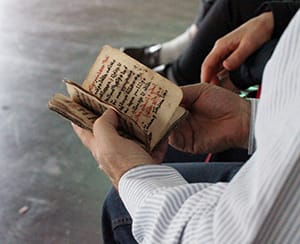 That many again –mainly students and faculty scholars — came to the same room at 4 p.m. to hear Fr. Columba Stewart, a nationally prominent humanities scholar and Benedictine monk who rescues rare ancient manuscripts around the world. With engaging wit and accessible erudition, he matter-of-factly related his frequent and sometimes hair-raising and swashbuckling international adventures as he and colleagues fearlessly find and save and photocopy rare, mostly religious manuscripts in dangerous world hot-spots from Iraq, Turkey, Syria and Egypt to Timbuktu – adventures that sounded at times more than a little like an Indiana Jones movie script.
That many again –mainly students and faculty scholars — came to the same room at 4 p.m. to hear Fr. Columba Stewart, a nationally prominent humanities scholar and Benedictine monk who rescues rare ancient manuscripts around the world. With engaging wit and accessible erudition, he matter-of-factly related his frequent and sometimes hair-raising and swashbuckling international adventures as he and colleagues fearlessly find and save and photocopy rare, mostly religious manuscripts in dangerous world hot-spots from Iraq, Turkey, Syria and Egypt to Timbuktu – adventures that sounded at times more than a little like an Indiana Jones movie script.
His talk, accompanied by interesting accompanying slides, was presented as part of The Phi Beta Kappa Society Visiting Scholars program with an introduction from Professor George Dameron of the history and humanities faculty and a Phi Beta Kappa campus leader. Fr. Stewart, educated at Harvard, Yale and Oxford, is executive director of The Hill Museum and Manuscript Library in Collegeville, MN, and the 2019 Jefferson Lecturer in the Humanities – previous holders of that title are Ken Burns, John Updike, Henry Louis Gates Jr, Toni Morrison and Robert Penn Warren.
Funding for the Steve Auth Food For Thought luncheon came from event sponsors who included the Edmundite Center for Faith and Culture under direction of Fr. David Theroux, S.S.E. ’70, Edmundite Campus Ministry under direction of Fr. Brian Cummings, S.S.E. ’86, and the College’s Institutional Advancement Office special funds. Saint Michael’s President Lorraine Sterritt attended both events and remarked afterward about the power and engaging dynamic style that each speaker brought to his respective talk.
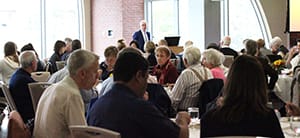
Before speaking, Auth showed a video about his Gospel-preaching work in “one of the most religiously hostile environments in America” – namely, Wall Street. His PowerPoint that accompanied his talk laid out “Twelve Paths to the Heart of a Missionary: Lessons from Art, The Gospels and the Mission.” Those paths, accompanied by classic images from the great painting masters, were “1. Embrace Suffering; “2. Answer the phone” (listening for and heeding God’s call); 3. Silence and prayer; 4. The sacrament of reconciliation; 5. The shared experience with Jesus; 6. Having a “Friend for the Journey”; 7. “Confident joy”; 8. Perseverance; 9. Dignity; 10. Humility; 11. Faith and hope, and last but not least, 12. Love.
To illustrate each, he spoke from his personal faith experiences, which he said began when he had had a serious heart problem in 2002 and a priest brought him the anointing of the sick, offering his first confession in 25 years while commenting “you’re a man who’s been given very many talents, and you’ve been a very poor steward … using them for your own purposes.” Auth said he decided then that if he survived, he would serve God if he felt God calling him, which started his journey of witnessing on the streets.
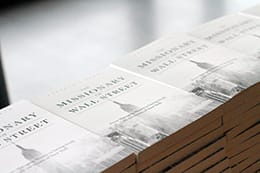
Each conversation with a person he encounters begins by asking “Are you Catholic?” and conversations typically evolve organically from there if the respondent is not too hostile, he said, regardless of the faith of the person being addressed. Through the ministry, he unmistakably began to see God working in mysterious and uncanny ways, he said, “and you start to trust Him as the relationship builds, as he delivers time and again.” His wife and other fellow missionaries have been by his side to provide the critical moral support that everyone needs to follow Christ, he said. Too many souls, on Wall Street in particular, are “seeking the secular dream …. seeking the Creator but chasing his creations – they’ve been told by society that will make them happy.” It’s important for Auth to show others the joy of being a believer, though always with humility, since pride “is a root evil in all human beings that gets in the way of relationship with God.” He told of one encounter with a Hindu monk who told him “‘You’re not going to convert me … but what has converted me[ in a sense] is watching you at work, how you deeply love each person that you encounter even if they are saying something abusive as many of them do — you seem to love them deeply. I haven’t seen this kind of thing on the streets of New York, and it’s moving.’”
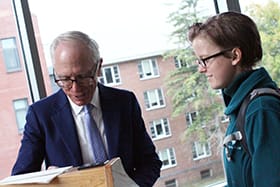
A monk on a different mission
To illustrate the heart of his mission as a seeker and preserver of ancient manuscripts, Father Columba Stewart, OSB, started by telling the story of a particular text of the writings of Origen — “the most important theologian of the early church in the Greek tradition and also important in the Latin world,” and how that text and story moves “through languages and manuscripts, provides evidence of cultural contact, and shows what such manuscripts can tell us about important historical, geopolitical events and how they raise questions of cultural heritage”: ”To whom does it belong?” is one such question, given that colonial powers often have taken things that weren’t theirs, he said. His example of one particular manuscript of Origen’s writing from a British library led him to intriguing and extended sleuthing and the making of cultural connections over many years, which he described in absorbing detail from the Vatican to Saint Petersburg, Russia, to Odessa in Turkey to Egypt, with Greek, Latin, Syriac and texts of other languages like Hebrew or Arabic all figuring into the puzzle. Figuring into it too, he noted, were Church and political history such as Origen’s diminishment among church leaders later in history as a heretic.
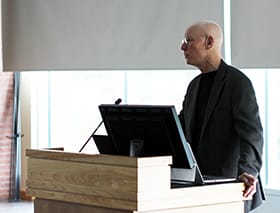
A key answer to that question can be found at places like the Minnesota monastery and college-based manuscript library that Fr. Stewart oversees; happily, he said, advances in digital technology are making the task immeasurably easier and more comprehensive than in ages gone by when Benedictines through many centuries made hand-made copies to preserve such traditions.
He said Benedictines such as himself are, in a sense,”communities of readers” — “and if you’re going to be focused on texts, you have to have them, and if you’re going to have them, you have to have copies.” So it was in ancient times, and so it still is today, he suggested, even though the means of copying has changed, From just a practical preservation standpoint, he noted, the taking of manuscripts through the centuries by former colonial powers such as England and continental European nations has taken a physical toll upon ancient documents, once they are out of their Middle Eastern original homes that have dry extreme heat, since those areas of origin that preserved manuscripts well for so long “are difficult for people, but great for manuscripts.”
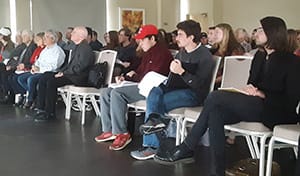
One story he told was of hunkering down in a small room with a Dominican colleague and others, hoping advancing Islamic troops didn’t find them in then-embattled Timbuktu. Another story had him in just-liberated former ISIS territories only a couple years ago at an important monastery for texts that he had known pre-ISIS. He was there after the liberation in 2017 with a CBS news team that had security. “The good news was we had already digitalized” the manuscripts that they expected to find destroyed, and so had copies. But lo and behold, they found the actual original manuscripts in a broom closet with a bricked up window that ISIS never found, even though the building had been turned into a bomb-making factory during the occupation. They have not been so lucky at other key cultural sites, however, he said, and with colleagues, he would often return to find whole collections and irreplaceable heritages destroyed. It was a “soul- destroying thing” to have once seen these sites and manuscripts in their glory through his years of research and then to see them desecrated and destroyed, such as in Aleppo in Syria and many other key ancient cities like Mosul in Iraq.
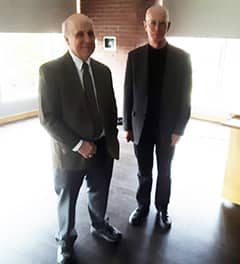
“What do you do?” when hoping to preserve a valuable manuscript, he asked rhetorically, quickly answering his own question with a grin that seemed rooted in the long-repeated solution from history he had just laid out: “You call a monk!”


